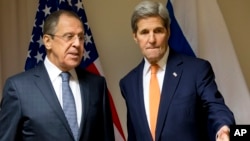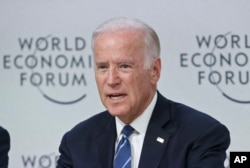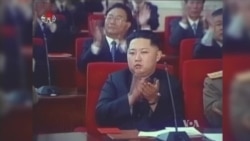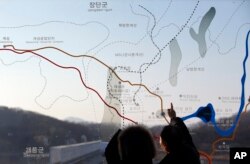Uncertainty over the timing of urgent talks on Syria's future and the humanitarian crisis in the war-torn nation were high on the agenda as U.S. Secretary of State Kerry and Russian Foreign Minister Sergey Lavrov met Wednesday in Switzerland.
Kerry pressed Russia "to use its influence" with the regime of Syrian President Bashar al-Assad, a U.S. spokesman said, "to ensure immediate, unimpeded and sustained humanitarian access to all Syrians in need, especially those in besieged areas such as Madaya.”
State Department spokesman John Kirby was speaking with reporters after the Kerry-Lavrov talks in Zurich, on the sidelines of the World Economic Forum in Davos, Switzerland.
Lavrov confirmed that Russia agrees the most important issue now is getting help for civilians trapped in the Syrian war zone.
"We have confirmed the necessity to solve humanitarian problems in Syria," Lavrov said, according to Russia's Tass news agency.
On the diplomatic front, Kerry and Lavrov indicated the scheduled start on Monday of U.N.-mediated talks about Syria is in jeopardy.
The U.S. and Russia are key members of the International Syria Support Group, which has promoted a U.N. plan for a political transition to end Syria's long and bloody civil war. The next step on that path was to be U.N.-mediated talks between the Assad government and the opposition groups fighting to oust him.
There is widespread disagreement over which opposition groups should take part in the U.N. talks, and officials say the meetings next week cannot proceed until there is a mutually acceptable list of which anti-Assad factions will take part.
More critically, a failure to get the talks underway would hamper efforts to launch a cease-fire in Syria.
Heading into his meeting with Kerry, Lavrov was asked whether he thinks the talks about Syria actually will begin Monday.
“We will see,” Lavrov said. That question, he added, is “mostly for de Mistura, not for us” — a reference to Staffan de Mistura, the U.N. special envoy for Syria.
The State Department's Kirby told reporters earlier that it is the U.S. “desire” to see the meeting begin on the 25th, but "we’ll just have to see how things go.”
Kerry's trip to the Davos conference is the first step on a five-nation tour that also will take him through the Middle East and Asia.
Davos focus
The annual World Economic Forum pairs heads of state and government with executives from some of the world’s leading companies. In addition to Kerry, Vice President Joe Biden and Defense Secretary Ash Carter are among the U.S. officials at the event.
In a keynote address at the forum Wednesday, Biden urged business executives to support initiatives that will strengthen the middle class.
“My call to action here is simple,” said Biden. “Embrace the obligation to your workers as well as to your shareholders."
Biden also met with Greek Prime Minister Alexis Tsipras. The two leaders agreed on the importance of Greece moving forward on economic reforms as quickly as possible.
Kerry will address the economic forum Friday. Four focal points for him will be the importance of tackling corruption, clean energy initiatives, expanding Internet connectivity and the environment, according to a senior U.S. official.
Carter told reporters traveling with him that he wanted to discuss cooperation between the Pentagon and the "innovative industry," and also will be holding talks on the campaign against the Islamic State group.
The annual World Economic Forum is a "benchmark exercise," setting out issues that will be of key importance for the rest of the year, according to global economy analyst John McArthur of the Brookings Institution.
From Switzerland, Kerry travels to Riyadh for talks with Saudi officials and foreign ministers of the Gulf Cooperation Council.
WATCH: VOA's Pamela Dockins reports on Kerry's travels
Next stop: Saudi Arabia
The visit comes days after implementation of the major world powers' nuclear deal with Iran, an agreement that Saudi Arabia and other Gulf states say could result in Iran destabilizing the region. The U.S. has been trying to keep tensions between Iran and the Saudis, who are firm U.S. allies, from spilling over into the unrest in Yemen and other issues of regional concern.
From Riyadh, Kerry travels to Laos and Cambodia for talks to prepare for ASEAN summit in February hosted by the U.S.
The White House says meetings with members of the Association of Southeast Asian Nations are part of President Barack Obama's "rebalance" of U.S. policy toward Asia and the Pacific.
Concerns about North Korea
Kerry's final stop, China, comes amid heightened concerns about North Korea's latest nuclear test and the possible response from the international community.
Deputy Secretary of State Anthony Blinken discussed North Korea's provocation with his South Korean and Japanese counterparts last week in Tokyo.
"All parties affirmed our mutual interest in security, a robust international response to uphold a rules-based order," the State Department said Monday.
China is key to the effort to persuade North Korea to cooperate with the international community, analysts say.
"North Korea gets something like 80 percent of its food and fuel from China and also China is North Korea's closest friend, for what it's worth, in the international community," said Council on Foreign Relations analyst Scott Snyder.
However, he added that China might be reluctant to support additional U.N. Security Council penalties against North Korea because of concern that further sanctions against Pyongyang could increase regional instability.
Chris Hannas in Washington contributed to this report.















